Fleurs du Mal Magazine


Or see the index

Just A Woman
You ask me why I love her;
Not a charm can you discover!
Would you see
The heart that a shut rose is,
And whose beauty ne’er uncloses
Save for me?
She is not rich or clever,
But her speeches thrill me ever,
And with bliss
My heart her whisper flutters,
Though the wisest word she utters
Is a kiss.
All evil things have shunned her,
And with a wide-eyed wonder
Is she tasked,
What lavish god has given
In her earth so much of heaven
All unasked?
She has no gifts or graces,
But the gladness in her face is
Sought of kings;
She cannot chant a measure,
But her heart with a grave pleasure
Ever sings.
Her gown is of the whitest
But the hem is soiled the slightest:
Little worth,
She has no wings to fly with,
And she prefers to hie with
Me on earth.
There is no hint of heaven
Or glimpse of deep thought even
In her eyes;
She is warm and she is human,
Just a weak and wilful woman —
Not too wise.
Her thousand beauties singing,
I have not said how clinging
Are her arms;
But, not loved and not the lover
Dare you ever hope discover
Half her charms?
Arthur Adams
(1872-1936)
Just A Woman
• fleursdumal.nl magazine
More in: Adams, Arthur, Archive A-B, Archive A-B, THEATRE
When Tamsin Calidas first arrives on a remote island in the Scottish Hebrides, it feels like coming home.
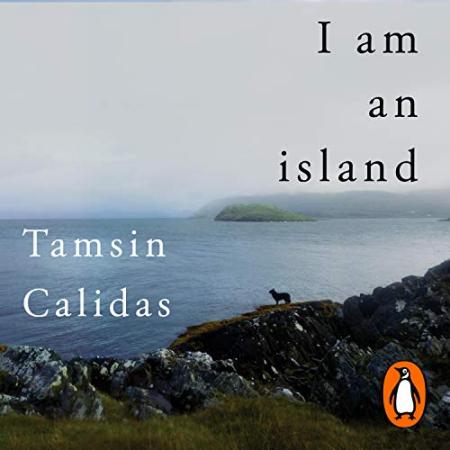
Disenchanted by London, she and her husband left the city and high-flying careers to move the 500 miles north, despite having absolutely no experience of crofting, or of island life. It was idyllic, for a while.
But as the months wear on, the children she’d longed for fail to materialise, and her marriage breaks down, Tamsin finds herself in ever-increasing isolation. Injured, ill, without money or friend she is pared right back, stripped to becoming simply a raw element of the often harsh landscape. But with that immersion in her surroundings comes the possibility of rebirth and renewal. Tamsin begins the slow journey back from the brink.
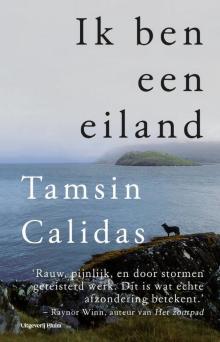 Startling, raw and extremely moving, I Am An Island is a story about the incredible ability of the natural world to provide when everything else has fallen away – a stunning book about solitude, friendship, resilience and self-discovery.
Startling, raw and extremely moving, I Am An Island is a story about the incredible ability of the natural world to provide when everything else has fallen away – a stunning book about solitude, friendship, resilience and self-discovery.
Tamsin Calidas is a writer and photographer living in the wilds of the Scottish Hebrides. She worked in London before giving it all up in 2004 to move to a tiny, remote island in Scotland to run a derelict croft with sheep and horses.
I Am An Island
by Tamsin Calidas
2020
Language: English
304 pages
ISBN-10: 0857526650
ISBN-13: 978-0857526656
Hardcover $23.25
Paperback $14.50
Ik ben een eiland
door Tamsin Calidas
Vertaling Hans Kloos
2021
Nederlands
ISBN 9789083095394
Uitgeverij Pluim
320 pagina’s
Paperback € 22,99
• fleursdumal.nl magazine
More in: - Book News, - Bookstores, Archive C-D, Natural history
Een vader is een man die kinderen verwekt,’ antwoordde je toen ik er eens naar vroeg.
‘Wie heeft mij dan verwekt?’ wilde ik weten. Je pakte me bij mijn kin en keek me indringend aan.
‘We zijn niet op zoek naar een vader,’ zei je. ‘We zijn op zoek naar een prins.’
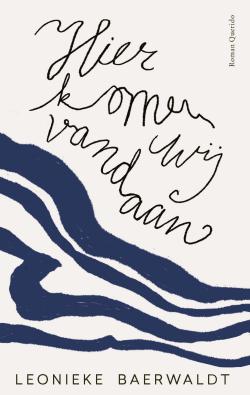
Hier komen wij vandaan –
Leonieke Baerwaldt
Een moeder en dochter leiden een zwervend bestaan, een fabrieksarbeider droomt erover een tropische-vissenwinkel te beginnen, twee geliefden besluiten samen een huis te bouwen en de kleine zeemeermin wordt geconfronteerd met de harde werkelijkheid.
In dit verhaal over diermensen en mensdieren vinden de sprookjes van Andersen en Grimm hun eigentijdse weerklank. Hier komen wij vandaan is een intens en bijzonder debuut van een verrassende nieuwe stem in de literatuur.
Auteur: Leonieke Baerwaldt
Titel: Hier komen wij vandaan
Vorm Paperback
Uitgever Querido
Druk 1e
Verschenen 24-08-2021
Taal Nederlands
Pagina’s 224 pp.
Genre Literaire fictie
NUR: 301
ISBN 9789021421278
Prijs: € 20,00
• fleursdumal.nl magazine
More in: - Book News, - Book Stories, Archive A-B, Grimm, Andersen e.o.: Fables, Fairy Tales & Stories, Tales of Mystery & Imagination
Kaveh Akbar’s exquisite, highly anticipated follow-up to Calling a Wolf a Wolf.
 With formal virtuosity and ruthless precision, Kaveh Akbar’s second collection takes its readers on a spiritual journey of disavowal, fiercely attendant to the presence of divinity where artifacts of self and belonging have been shed. How does one recover from addiction without destroying the self-as-addict?
With formal virtuosity and ruthless precision, Kaveh Akbar’s second collection takes its readers on a spiritual journey of disavowal, fiercely attendant to the presence of divinity where artifacts of self and belonging have been shed. How does one recover from addiction without destroying the self-as-addict?
And if living justly in a nation that would see them erased is, too, a kind of self-destruction, what does one do with the body’s question, “what now shall I repair?” Here, Akbar responds with prayer as an act of devotion to dissonance―the infinite void of a loved one’s absence, the indulgence of austerity, making a life as a Muslim in an Islamophobic nation―teasing the sacred out of silence and stillness.
Richly crafted and generous, Pilgrim Bell’s linguistic rigor is tuned to the register of this moment and any moment. As the swinging soul crashes into its limits, against the atrocities of the American empire, and through a profoundly human capacity for cruelty and grace, these brilliant poems dare to exist in the empty space where song lives―resonant, revelatory, and holy.
Kaveh Akbar founded and edits Divedapper, where he interviews major voices in contemporary poetry. His poems have appeared in The New Yorker, Poetry, Tin House, APR, PBS NewsHour, and elsewhere. He is the author of the chapbook Portrait of the Alcoholic (Sibling Rivalry Press, January 2017) and full-length collection Calling a Wolf a Wolf (Alice James Books, September 2017). Akbar has received a Pushcart and a Lucille Medwick Memorial Award from the Poetry Society of America. In 2016, Akbar was a recipient of the Ruth Lilly and Dorothy Sargent Rosenberg Poetry Fellowship from the Poetry Foundation. He was born in Tehran, Iran, and is currently a professor in the MFA program at Purdue University and in the low-residency program at Randolph College.
(. . .)
Corporeal friends are
spiritual enemies, said
Blake, probably gardening
in the nude. Today I’m trying
to scowl more, mismatch
my lingerie. Nobody
seems bothered enough.
(. . .)
Pilgrim Bell
Poems
by Kaveh Akbar
Publisher: Graywolf Press
August 3, 2021
Language: English
Paperback
80 pages
ISBN-10 : 1644450593
ISBN-13 : 978-1644450598
$13.70
• fleursdumal.nl magazine
More in: #Editors Choice Archiv, - Book News, - Bookstores, Archive A-B, Archive A-B
« J’ai appris à connaître toutes les pierres de la rivière. J’ai compris que ces pierres n’ont pas besoin d’apprendre à me connaître ; que la nature n’a pas besoin de moi. Que moi seule ai besoin d’elle. »
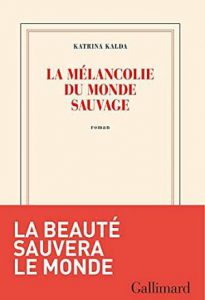 Rien ne destinait Sabrina à une carrière artistique. Élevée par une mère fragile dans un milieu modeste, elle a peu de perspectives d’avenir.
Rien ne destinait Sabrina à une carrière artistique. Élevée par une mère fragile dans un milieu modeste, elle a peu de perspectives d’avenir.
Jusqu’au jour où, lors de la visite scolaire du musée Rodin, elle découvre sa vocation : elle consacrera sa vie à l’art. Dès lors, Sabrina se voue totalement à ce projet. La précarité étudiante est vite compensée par les amitiés fortes et la richesse des recherches artistiques. Mais les soubresauts de sa vie amoureuse et les bouleversements d’un monde dont l’effondrement semble inéluctable ne tardent pas à infléchir sa trajectoire.
À travers le destin d’une artiste contemporaine, Katrina Kalda interroge la place de l’art dans un univers en crise. Son écriture, harmonieuse et assurée, soutient ce roman plein d’émotions.
Katrina Kalda
La mélancolie du monde sauvage
Littérature française
Romans et récits
ISBN : 9782072925344
EAN : 9782072925344
280 pages
Éditeur: Gallimard
06/05/2021
140 x 205 mm
€ 20,00
• fleursdumal.nl magazine
More in: - Book Lovers, - Book Stories, Archive K-L, Auguste Rodin, Camille Claudel, Sculpture

De elfde editie van Lustwarande, STATIONS, die terugblikt op twintig jaar expositiepraktijk in De Oude Warande, is nog drie weken te zien (tot 3 oktober 2021).
Museumtijdschrift afgelopen week over STATIONS:
“De installatie (van Navid Nuur (red.)) laat dan ook de kracht zien van Lustwarande, die dit jaar geen overkoepelend thema kent: door gebruik te maken van de natuurlijke omgeving komt het werk van iedere kunstenaar telkens even verrassend, maar treffend tot zijn recht.”
LUSTWARANDE 2021 – STATIONS
STATIONS verwijst naar het moment dat de kunstenaars deelnamen aan Lustwarande in het begin van hun loopbaan, of juist later, op diverse tijdstippen in een spanne van twintig jaar, soms herhaaldelijk – en de huidige fase in hun carrière, nu ze allen midcareer en established zijn. Tegelijk verwijst de titel naar de voor de locatie zo essentiële seizoenswisselingen en naar de staties van het leven, naar het verstrijken van de tijd, naar transformatie en vergankelijkheid, en naar het voor Lustwarande en aanverwante buitenexposities zo belangrijke aspect wandelen. Waar je als wandelaar bij de afzonderlijke beelden, staties op zich, halt houdt, ontvouwen zich nieuwe verhalen, die voelbaar maar niet direct aanwijsbaar onderling verbonden zijn.
STATIONS – 11 e EDITIE LUSTWARANDE
3 juli – 3 oktober 2021
Park De Oude Warande, Tilburg
Good art revolutionizes your whole being. It is something that stops you, or slows you down – Ugo Rondinone
Dit jaar blikt Lustwarande met trots terug op twintig jaar expositiepraktijk in De Oude Warande. Voor STATIONS zijn daarom alleen kunstenaars uitgenodigd die, veelal als jonge talenten, eerder aan Lustwarande hebben deelgenomen. De geselecteerde kunstenaars, twaalf uit een lijst van honderdvijfenzeventig, hebben sinds hun eerdere deelname oeuvres ontwikkeld die inmiddels bepalend zijn voor de internationale sculpturale canon en zijn daarom van groot belang om getoond te worden.
Deelnemende kunstenaars: Monica Bonvicini (IT) – Tom Claassen (NL) – Michel François & Douglas Eynon (BE/GB) – Gereon Krebber (DE) – Mark Manders (NL) – Navid Nuur (IR/NL) – Thomas Rentmeister (DE) – Ugo Rondinone (CH) – Maria Roosen (NL) – Marien Schouten (NL) – Erwin Wurm (AU)
Curator: Chris Driessen, artistiek directeur Lustwarande
LUSTWARANDE
Bezoekadres: Lustwarande – Platform for Contemporary Sculpture, park De Oude
Warande, Bredaseweg 441, Tilburg

NOG 3 WEKEN TE ZIEN: LUSTWARANDE STATIONS
• fleursdumal.nl magazine
More in: - Bookstores, Architecture, Art & Literature News, AUDIO, CINEMA, RADIO & TV, Dutch Landscapes, Exhibition Archive, Fundament - Lustwarande, Performing arts, Sculpture
The director of the famed Bodleian Libraries at Oxford narrates the global history of the willful destruction―and surprising survival―of recorded knowledge over the past three millennia.
 Libraries and archives have been attacked since ancient times but have been especially threatened in the modern era. Today the knowledge they safeguard faces purposeful destruction and willful neglect; deprived of funding, libraries are fighting for their very existence. Burning the Books recounts the history that brought us to this point.
Libraries and archives have been attacked since ancient times but have been especially threatened in the modern era. Today the knowledge they safeguard faces purposeful destruction and willful neglect; deprived of funding, libraries are fighting for their very existence. Burning the Books recounts the history that brought us to this point.
Richard Ovenden describes the deliberate destruction of knowledge held in libraries and archives from ancient Alexandria to contemporary Sarajevo, from smashed Assyrian tablets in Iraq to the destroyed immigration documents of the UK Windrush generation. He examines both the motivations for these acts―political, religious, and cultural―and the broader themes that shape this history. He also looks at attempts to prevent and mitigate attacks on knowledge, exploring the efforts of librarians and archivists to preserve information, often risking their own lives in the process.
More than simply repositories for knowledge, libraries and archives inspire and inform citizens. In preserving notions of statehood recorded in such historical documents as the Declaration of Independence, libraries support the state itself. By preserving records of citizenship and records of the rights of citizens as enshrined in legal documents such as the Magna Carta and the decisions of the US Supreme Court, they support the rule of law. In Burning the Books, Ovenden takes a polemical stance on the social and political importance of the conservation and protection of knowledge, challenging governments in particular, but also society as a whole, to improve public policy and funding for these essential institutions.
Richard Ovenden
Burning the books. A history of knowledge under attack
Publisher: Belknap Press
An Imprint of Harvard University Press
November 17, 2020
Language: English
Hardcover
320 pages
ISBN-10: 0674241207
ISBN-13: 978-0674241206
$29.95
Burning the Books is available internationally through the following publishers:
US: Harvard UP
German: Surhkamp
Italian: Solferino
Spanish: Editorial Critica
Arabic: Arab Scientific Publishers
• fleursdumal.nl magazine
More in: - Book Lovers, - Book News, - Book Stories, Archive O-P, Libraries in Literature
The definitive anthology of Jim Morrison‘s writings with rare photographs and numerous handwritten excerpts of unpublished and published poetry and lyrics from his 28 privately held notebooks.
 You can also hear Jim Morrison’s final poetry recording, now available for the first time, on the CD or digital audio edition of this book, at the Village Recorder in West Los Angeles on his twenty-seventh birthday, December 8, 1970.
You can also hear Jim Morrison’s final poetry recording, now available for the first time, on the CD or digital audio edition of this book, at the Village Recorder in West Los Angeles on his twenty-seventh birthday, December 8, 1970.
The audio book also includes performances by Patti Smith, Oliver Ray, Liz Phair, Tom Robbins, and others reading Morrison’s work.
Created in collaboration with Jim Morrison’s estate and inspired by a posthumously discovered list entitled “Plan for Book,”
The Collected Works of Jim Morrison is an almost 600-page anthology of the writings of the late poet and iconic Doors’ front man. This landmark publication is the definitive opus of Morrison’s creative output—and the book he intended to publish. Throughout, a compelling mix of 160 visual components accompanies the text, which includes numerous excerpts from his 28 privately held notebooks—all written in his own hand and published here for the first time—as well as an array of personal images and commentary on the work by Morrison himself.
 This oversized, beautifully produced collectible volume contains a wealth of new material—poetry, writings, lyrics, and audio transcripts of Morrison reading his work.
This oversized, beautifully produced collectible volume contains a wealth of new material—poetry, writings, lyrics, and audio transcripts of Morrison reading his work.
Not only the most comprehensive book of Morrison’s work ever published, it is immersive, giving readers insight to the creative process of and offering access to the musings and observations of an artist whom the poet Michael McClure called “one of the finest, clearest spirits of our times.”
This remarkable collector’s item includes:
• Foreword by Tom Robbins; introduction and notes by editor Frank Lisciandro that provide insight to the work; prologue by Anne Morrison Chewning
• Published and unpublished work and a vast selection of notebook writings
• The transcript, the only photographs in existence, and production notes of Morrison’s last poetry recording on his twenty-seventh birthday
• The Paris notebook, possibly Morrison’s final journal, reproduced at full reading size
• Excerpts from notebooks kept during his 1970 Miami trial
• The shooting script and gorgeous color stills from the never-released film HWY
• Complete published a I Look Back”: a compelling autobiography in poem form
• Family photographs as well as images of Morrison during his years as a performer
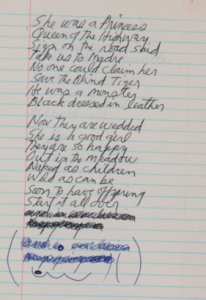
James Douglas Morrison
(1943-1971) was a poet, filmmaker, screenwriter, and the lead singer of as well as the lyricist and a composer for The Doors. Prior to his death, Morrison self-published three limited-edition volumes of his poetry: The Lords/Notes on Vision (1969), The New Creatures (1969), and An American Prayer (1970). Simon & Schuster published the combined The Lords and the New Creatures in 1970. Posthumous editions of Morrison’s writings include Wilderness: The Lost Writings of Jim Morrison, Volume I (1988) and The American Night: The Lost Writings of Jim Morrison, Volume II (1990).
The Collected Works of Jim Morrison
Poetry, Journals, Transcripts, and Lyrics
By Jim Morrison, Foreword by Tom Robbins
On Sale: June 8, 2021
Publisher: Harper Design
Language: English
Hardcover: 584 pages
ISBN-10 : 0063028972
ISBN-13 : 978-0063028975
Item Weight: 4.44 pounds
Dimensions: 7.7 x 2 x 10.6 inches
$39.99
The Collected Works of Jim Morrison
CD: Poetry, Journals, Transcripts, and Lyrics
Audio CD – Unabridged.
Performed by Jim Morrison, Patti Smith, Liz Phair, Oliver Ray, Tom Robbins, Frank Lisciandro, Anne Morrison Chewning, Sefton Graham, and Ian Morrison.
Includes Jim Morrison’s final poetry recording, now available for the first time, at the Village Recorder in West Los Angeles on his 27th birthday, December 8, 1970.
Audio CD
$23.99
• fleursdumal.nl magazine
More in: #Archive A-Z Sound Poetry, #Editors Choice Archiv, Archive M-N, Archive M-N, AUDIO, CINEMA, RADIO & TV, Jim Morrison
As this urgent, genre-defying book opens, a woman who has recently been elevated to prominence for her social media posts travels around the world to meet her adoring fans.
 She is overwhelmed by navigating the new language and etiquette of what she terms “the portal,” where she grapples with an unshakable conviction that a vast chorus of voices is now dictating her thoughts. When existential threats—from climate change and economic precariousness to the rise of an unnamed dictator and an epidemic of loneliness—begin to loom, she posts her way deeper into the portal’s void.
She is overwhelmed by navigating the new language and etiquette of what she terms “the portal,” where she grapples with an unshakable conviction that a vast chorus of voices is now dictating her thoughts. When existential threats—from climate change and economic precariousness to the rise of an unnamed dictator and an epidemic of loneliness—begin to loom, she posts her way deeper into the portal’s void.
An avalanche of images, details, and references accumulate to form a landscape that is post-sense, post-irony, post-everything. “Are we in hell?” the people of the portal ask themselves. “Are we all just going to keep doing this until we die?”
Suddenly, two texts from her mother pierce the fray: “Something has gone wrong,” and “How soon can you get here?” As real life and its stakes collide with the increasingly absurd antics of the portal, the woman confronts a world that seems to contain both an abundance of proof that there is goodness, empathy, and justice in the universe, and a deluge of evidence to the contrary.
Fragmentary and omniscient, incisive and sincere, No One Is Talking About This is at once a love letter to the endless scroll and a profound, modern meditation on love, language, and human connection from a singular voice in American literature.
Patricia Lockwood is the author of a novel, No One Is Talking About This; a memoir, Priestdaddy; and two poetry collections, Motherland Fatherland Homelandsexuals and Balloon Pop Outlaw Black. Her writing has appeared in the New Yorker, the New York Times, and the London Review of Books, where she is a contributing editor. Her works have been selected for series such as the Best American Essays, the Best American Poetry, and the Norton Anthology of American Literature. She lives in Savannah, Georgia.
No One Is Talking About This
by Patricia Lockwood
Novel
February 16, 2021
Publisher: Riverhead Books
Language: English
Hardcover
224 pages
ISBN-10: 0593189582
ISBN-13: 978-0593189580
$22.49
LONGLISTED FOR THE 2021 BOOKER PRIZE
FINALIST FOR THE WOMEN’S PRIZE
LONGLISTED FOR THE CENTER FOR FICTION FIRST NOVEL PRIZE
• fleursdumal.nl magazine
More in: - Book News, - Bookstores, Archive K-L

Little Red Riding-Hood
If you listen, children, I will tell
The story of little Red Riding-hood:
Such wonderful, wonderful things befell
Her and her grandmother, old and good
(So old she was never very well),
Who lived in a cottage in a wood.
Little Red Riding-hood, every day,
Whatever the weather, shine or storm,
To see her grandmother tripped away,
With a scarlet hood to keep her warm,
And a little mantle, soft and gay,
And a basket of goodies on her arm.
A pat of butter, and cakes of cheese,
Were stored in the napkin, nice and neat;
As she danced along beneath the trees,
As light as a shadow were her feet;
And she hummed such tunes as the bumble-bees
Hum when the clover-tops are sweet.
But an ugly wolf by chance espied
The child, and marked her for his prize.
“What are you carrying there?” he cried;
“Is it some fresh-baked cakes and pies?”
And he walked along close by her side,
And sniffed and rolled his hungry eyes.
“A basket of things for granny, it is,”
She answered brightly, without fear.
“Oh, I know her very well, sweet miss!
Two roads branch towards her cottage here;
You go that way, and I’ll go this.
See which will get there first, my dear!”
He fled to the cottage, swift and sly;
Rapped softly, with a dreadful grin.
“Who’s there?” asked granny. “Only I!”
Piping his voice up high and thin.
“Pull the string, and the latch will fly!”
Old granny said; and he went in.
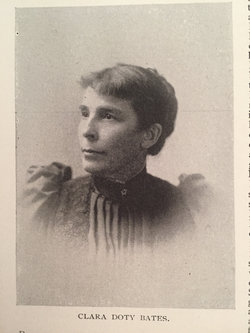
He glared her over from foot to head;
In a second more the thing was done!
He gobbled her up, and merely said,
“She wasn’t a very tender one!”
And then he jumped into the bed,
And put her sack and night-cap on.
And he heard soft footsteps presently,
And then on the door a timid rap;
He knew Red Riding-hood was shy,
So he answered faintly to the tap:
“Pull the string and the latch will fly!”
She did: and granny, in her night-cap,
Lay covered almost up to her nose.
“Oh, granny dear!” she cried, “are you worse?”
“I’m all of a shiver, even to my toes!
Please won’t you be my little nurse,
And snug up tight here under the clothes?”
Red Riding-hood answered, “Yes,” of course.
Her innocent head on the pillow laid,
She spied great pricked-up, hairy ears,
And a fierce great mouth, wide open spread,
And green eyes, filled with wicked leers;
And all of a sudden she grew afraid;
Yet she softly asked, in spite of her fears:
“Oh, granny! what makes your ears so big?”
“To hear you with! to hear you with!”
“Oh, granny! what make your eyes so big?”
“To see you with! to see you with!”
“Oh, granny! what makes your teeth so big?”
“To eat you with! to eat you with!”
And he sprang to swallow her up alive;
But it chanced a woodman from the wood,
Hearing her shriek, rushed, with his knife,
And drenched the wolf in his own blood.
And in that way he saved the life
Of pretty little Red Riding-hood.
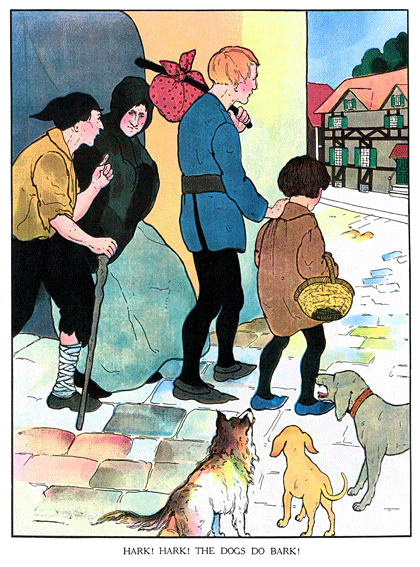
Hark, hark
The dogs do bark
Beggars are coming to town;
Some in jags,
Some in rags,
And some in velvet gowns.
Clara Doty Bates
(1838 – 1895)
Little Red Riding-Hood
Versified by Mrs. Clara Doty Bates
fleursdumal.nl magazine
More in: Archive A-B, Archive A-B, Bates, Clara Doty, Children's Poetry, Grimm, Andersen e.o.: Fables, Fairy Tales & Stories, Tales of Mystery & Imagination
Lana Del Rey follows in the same musician/poet footsteps as Joni Mitchell, Leonard Cohen, Jewel and Lou Reed.
 Lana’s music and lyrics evoke images of a saturated Kodachrome photograph, so it would stand to reason that she’d now add “poet” to her artist’s kit. Even without music, her words work their way around you, pulling you into a world that’s not unlike a David Lynch movie.
Lana’s music and lyrics evoke images of a saturated Kodachrome photograph, so it would stand to reason that she’d now add “poet” to her artist’s kit. Even without music, her words work their way around you, pulling you into a world that’s not unlike a David Lynch movie.
The New York Times bestselling debut book of poetry from Lana Del Rey, Violet Bent Backwards Over the Grass.
“Violet Bent Backwards Over the Grass is the title poem of the book and the first poem I wrote of many. Some of which came to me in their entirety, which I dictated and then typed out, and some that I worked laboriously picking apart each word to make the perfect poem. They are eclectic and honest and not trying to be anything other than what they are and for that reason I’m proud of them, especially because the spirit in which they were written was very authentic.” —Lana Del Rey
Lana’s breathtaking first book solidifies her further as “the essential writer of her times” (The Atlantic). The collection features more than thirty poems, many exclusive to the book: Never to Heaven, The Land of 1,000 Fires, Past the Bushes Cypress Thriving, LA Who Am I to Love You?, Tessa DiPietro, Happy, Paradise Is Very Fragile, Bare Feet on Linoleum, and many more. This beautiful hardcover edition showcases Lana’s typewritten manuscript pages alongside her original photography. The result is an extraordinary poetic landscape that reflects the unguarded spirit of its creator.
Violet Bent Backwards Over the Grass is also brought to life in an unprecedented spoken word audiobook which features Lana Del Rey reading fourteen select poems from the book accompanied by music from Grammy Award–winning musician Jack Antonoff.
Lana Del Rey is an American singer, songwriter, artist, and poet. Violet Bent Backwards Over the Grass is her first book.
Violet Bent Backwards over the Grass
by Lana Del Rey
Poetry
English language
Publisher: Simon & Schuster
Publication date: 09/29/2020
ISBN-13: 9781982167288
Pages: 128
Hardcover
$24.99
• fleursdumal.nl magazine
More in: # Music Archive, #Editors Choice Archiv, Archive C-D, Archive C-D, Lana Del Rey
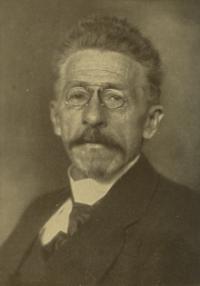
“Hab’ Sonne im Herzen”
Hab’ Sonne im Herzen, obs stürmt oder schneit
Ob der Himmel voll Wolken, die Erd voller Streit.
Hab’ Sonne im Herzen, dann komme was mag,
das leuchtet voll Licht dir den dunkelsten Tag.
Hab’ ein Lied auf den Lippen mit fröhlichem Klang
und macht auch des Alltags Gedränge dich bang!
Hab’ ein Lied auf den Lippen, dann komme was mag,
das hilft dir verwinden den einsamsten Tag!
Hab’ ein Wort auch für andre in Sorg’ und in Pein,
und sag, was dich selber so frohgemut lässt sein:
Hab’ ein Lied auf den Lippen, verlier nie den Mut,
hab’ Sonne im Herzen, und alles wird gut.
Cäsar Flaischlen
(1864-1920)
“Hab’ Sonne im Herzen”
• fleursdumal.nl magazine
More in: # Classic Poetry Archive, Archive E-F, Archive E-F
Thank you for reading Fleurs du Mal - magazine for art & literature